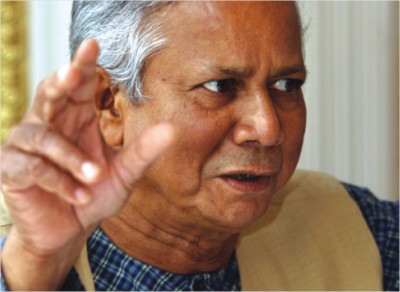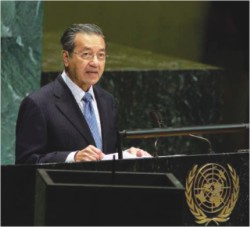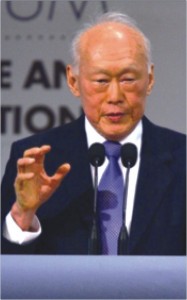
Inside
|
Reflections on leadership Habibul Haque Khondker ruminates on what it takes to be a political leader
In an interview with El Mundo Nobel Laureate Mohammad Yunus expressed his candid -- and may I add, somewhat undiplomatic -- opinion about US president George Bush: "Bush is a terrible leader, not only for the United States but for the entire world." President Bush's approval rating which stands at 35 per cent is one of the lowest in recent history. Professor Yunus was not far from the truth. Both are world famous. One for peace, the other for war. Do I need to tell you who is for what? In a curious way, both of them are leaders of the 21st century world. Leaders, minimally defined, are people whose decisions affect many. Bush's decisions have an impact on global warming and endangered climate, and are also about whether 20,000 additional soldiers should go to Iraq or not, or whether more blood should be spilled in Iraq or Sudan, or who knows where? Yunus's decisions also have an impact on many, though quietly, on whether more poor women in Bangladesh or elsewhere will receive small loans which will help them improve their lives. Bush has command over a vast arsenal; Yunus has a vast reservoir of goodwill. The former has the hard power, the latter the soft power. How did they become leaders? Education, hard work, or luck? Maybe a combination of all. Both of them are from rural towns, and studied in US universities. Yunus, having finished his education in Dhaka University, went to Vanderbilt, a fine institution; Bush went to Yale and Harvard, Ivy League universities. The former is the oldest Ph.D. granting university, the latter, established in 1636, is the oldest of American universities. These are venerated academic institutions. Yet, Woody Allen once said that Harvard also made mistakes, they let Kissinger teach there. Now, he would probably add to it by saying: "And they let George Bush graduate." Education helps, but success in leadership comes out of dedication, commitment, and the will to be a leader in whatever field you want. Leadership is a full-time job. You keep your eyes and ears open. You have to learn very fast, and learn all the time. You call up people for breakfast to discuss things. You put your mind to your work. You have to earn the respect of others for your competence and honesty. In the private sector, drive and love for money can be substitutes for educational credentials.
There is an important difference between becoming a leader and being put into a position of leadership. Some are born leaders, others achieve leadership, and some have leadership thrust upon them. I paraphrase Shakespeare slightly. In politics, being born into the right family -- a matter of pure luck -- helps in Singapore, India, the United States and in several other places. In business, you work hard and, with some luck, you make it to towering heights. But if you are born in the right family, things are much easier. Never discount luck. You have to be at the right place at the right time. That's luck for me. Leadership is about the power to do things. How that power is used is another story. Those who use the power emanating from their position, social influence, and charisma for the good of humanity will endure; will be remembered long after they are gone. Those who misuse power will also be remembered for their misdeeds. Both Gandhi and Hitler are remembered in history. The former brought hope and inspired others to devote to the cause of suffering humanity, the latter reminds us that evil is banal, and that human beings have endless capacity for inhumanity. These two leaders are representatives of two extremes. Most leaders fall in-between. The trigger for these reflections was talk about leadership teaching in academia. Under the pressure of corporate globalization, universities are increasingly coming under the spell of corporate culture. So, recently, I was hauled up to be told that we needed to include leadership training in our curriculum so that our students could become future leaders. My reply to the high level official was: you are looking at a failed leader. Successful leaders run big corporations, governments and NGOo; failed leaders end up as university teachers. If we want to teach leadership to our students, let's invite real leaders as guest lecturers. Let's try Mary Robinson, or Bill Gates, or Michael Dell, or Narayana Murthy of Infosys, or Rafida Aziz of Mayalsia or Richard Branson of Virgin Atlantic. In my extemporaneous list I included political leaders, Internet gurus, and business leaders. I did not choose Lee Kuan Yew or Mahathir Mohammad deliberately. Both of them are larger than life, they made huge contributions to building their respective nations, yet they are not above controversies and criticism. If you want to build a nation, you have to take tough decisions. A politician with conviction cannot make everyone happy. In the game of politics, you have to have more people in favour of you than against you. No politician can expect 100% approval rating. There are different types of leaders in different fields. I can think of academic leaders who are teachers, or researchers who could earn the respect of their fellow academicians by their honesty, sincerity and courage of conviction. Some professors become leaders in their own fields, people who dare to think new thoughts. Some academic leaders do make a successful transition to become leaders in the public life. Obviously, I exaggerated the point of academicians not being leaders. Look at Manomohan Singh of India, an economist, or F.H. Cardoso, former president of Brazil and a renowned sociologist. Though different skills are needed in different fields, leaders across the board have some common qualities. Courage, competence, dedication, willingness to learn, conviction and honesty are some of the qualities they share. Leaders are those who make things happen. They do not accept status-quo. They bring change. Whether those changes are for good or bad is sometimes decided by history. Rarely will one find leaders who are above controversy. It is the courage of conviction that makes some people take risks for which, depending on success or failure, they become known or perish. In Bangladesh, we do have excellent leaders whom people do not talk about, and some of these leaders are modest. Take Mr. Abed of BRAC. He has built the largest NGO in the world but avoided the glare of publicity. Or, Professor Rehman Sobhan, whose outstanding contribution to BIDS and creating CPD are no mean achievements. One can also draw examples from the private sectors, or grassroots levels, where peasants and land-poor villagers have thrown up leaders. Think of the leader of the Kansat movement. Dr. Yunus took a risk, triggered by a burning desire to do something to help the poor. He left the comfort zone of academia. Now that Dr Yunus has floated a political party, the analysts will find it interesting to see how far he can put his enormous enterprise, honesty and huge good-will to becoming a political leader. He is a leader, and most of his qualifications and skills can be used in nation-building. His only disadvantage is that he does not have a political party yet. Building a political party can be many times more difficult than leading a nation.
Our perception of leaders is shaped by our upbringing and our positions, as well as the circumstances that help make some people leaders. Leaders cannot be separated from followers. Even the definition of a leader is shaped by one's political, ideological, or religious position. One can transcend these and identify some individuals as leaders, regardless of how some factions may think otherwise. If there is a world-wide election Bush will not win. An American professor once told me that if voting was restricted to the university professors in America, Bush junior would never be elected president. But democracy, today, is based on adult franchise, and we live in a world dominated by the media. Images now play a key role in making leaders. In mass society, which appeared in the early part of the twentieth century, leaders are sometimes created by masses, but the more important fact is that leaders are required to take the masses under serious consideration. Sometimes democracy throws up bad leaders, especially when politics is controlled by big money and well-funded political advertisements. "The re-election of George Bush as president of the United States is a serious setback for the spirit of American democracy; the US has the longest-standing democracy in the world and is, therefore, a fundamental reference point. This time, at least, there are no technical reasons that can be blamed for the result. Nobody can contest the legitimacy of the election. Exercising their rights, the US electorate voted as they wished to vote. The result confirms that, although democracy may be the least imperfect of political regimes, it is still capable of making choices that bring to power dangerous demagogues." These were the words of Ignacio Ramonet, editor of Le Monde Diplomatique. Political leaders emerge out of political processes as they steer the course of the same processes. In the US, once, a leading Washington journalist said that he could just go down the Congress and, in a matter of hours, recruit the best president America could ever have. But that's not the way politics works. The standard joke about Hubert Humphrey was that he was the best president that America never had. Bill Bradley, a US senator, dropped out of politics because of his high ethical standards. A Princeton graduate, Bradely went to Oxford on a Rhodes scholarship. A reputed basketball player, Bradely was captain of his college team. He also played professionally in the NBA. He stood head and shoulders -- literally -- vis-à-vis other candidates, but failed to win the nomination of the Democratic Party in 2000. Al Gore did and failed, or was defeated by the Supreme Court, despite his brilliant credentials. George Bush in his reelection defeated Kerry, a Harvard man. Gore, too, went to Harvard. He never was a darling to the US electorate. He lacked charisma. Perhaps he was too smart. That's an inconvenient truth.
Dr. Yunus's decision to go into politics has been viewed by many as not a wise one. A friend of mine wrote: "He is the only person we are all banking on [to do something good], why does he have to get into the nasty deshi politics!?" Many want to see Dr. Yunus remain as a guide, a referee, a conscience of the nation, and not get mired in politics. He is above politics. The critics may be wrong. Dr. Yunus has gathered experience and skill that may be useful in opening a new chapter in Bangladesh politics. He has a good grasp of how things work in the villages in Bangladesh. He has an ability to connect with the poor, and with the big corporations. And he is not lacking in courage. Political leadership is for the brave hearts, and also for the highly active people. Dr. Yunus is both. Even if he is not successful, a new stream of politics -- a politics of anti-politics -- will be introduced in Bangladesh. Someday, under a new context, with a new political culture, that stream will become a sea. But for my average readers: If you do not aspire to be a leader stay where you are, and thank Shakespeare for the warning: "Uneasy lies the head that wears the crown." Photos: Nasir Ali Mamun, MICROSOFT, UN & AFP Habibul Haque Khondker teaches sociology at Zayed University, UAE. |

 Bill Gates is a leader. The success of Microsoft is the proof of his leadership. He, too, went to Harvard but did not graduate; he dropped out. So did Woody Allen, who dropped out of NYU and CUNY. Larry Ellison, the CEO of Oracle, dropped out of University of Illinois at Urbana Champaign, so did Steve Job, founder of Apple computers. Steven Spielberg dropped out of college, but did go back to fulfill his mother's dream 34 years later.
Bill Gates is a leader. The success of Microsoft is the proof of his leadership. He, too, went to Harvard but did not graduate; he dropped out. So did Woody Allen, who dropped out of NYU and CUNY. Larry Ellison, the CEO of Oracle, dropped out of University of Illinois at Urbana Champaign, so did Steve Job, founder of Apple computers. Steven Spielberg dropped out of college, but did go back to fulfill his mother's dream 34 years later.  Max Weber had three types of leaders in mind, traditional, legal/rational, and charismatic. In fact, these three types of leaders are products of three types of social contexts. Traditional leaders are by inheritance, legal leaders are those who work their way through the legal, constitutional frameworks, and the charismatic ones are the leaders who may or may not have exceptional, magical, qualities but people, by and large, and the supporters attribute exceptional qualities to those leaders. Charisma is a two way process. Individuals who become known as charismatic have, to begin with, an aura about themselves, they have some larger than life qualities. In the modern, media dominated age, the media can play a vital role in creating charisma. Bangabandhu was a truly charismatic leader.
Max Weber had three types of leaders in mind, traditional, legal/rational, and charismatic. In fact, these three types of leaders are products of three types of social contexts. Traditional leaders are by inheritance, legal leaders are those who work their way through the legal, constitutional frameworks, and the charismatic ones are the leaders who may or may not have exceptional, magical, qualities but people, by and large, and the supporters attribute exceptional qualities to those leaders. Charisma is a two way process. Individuals who become known as charismatic have, to begin with, an aura about themselves, they have some larger than life qualities. In the modern, media dominated age, the media can play a vital role in creating charisma. Bangabandhu was a truly charismatic leader.  In politics, being highly intellectual sometimes works against you. Dr. David Owen in United Kingdom was a good example. He was the youngest foreign secretary in post-war British politics. A clean cut leader who never became the prime minister of Britain. He formed the Social Democratic Party and faded from politics. He was the Dr Kamal Hossain of British politics. It is sad, but when you are too smart ordinary folks respect you but cannot identify with you. It is not a surprise, then, that Bertrand Russell failed to become a Member of Parliament. In American politics many people like to see politicians clean but not too clean, and educated but not too educated. Al Gore fell a victim to this paradox. And in Bangladesh it was Dr. Kamal Hossain who met the same fate. That does not mean that the achievements of Dr. Kamal Hossain are negligible. Sometimes failures of a heroic attempt are more successful than the successes of Mickey Mouse attempts. Even in the failure of his political party, Dr. Kamal will be remembered as one who stood up against corruption and criminalization of politics. What was once the feeble voice of an Oxford trained jurist has now become a clarion call.
In politics, being highly intellectual sometimes works against you. Dr. David Owen in United Kingdom was a good example. He was the youngest foreign secretary in post-war British politics. A clean cut leader who never became the prime minister of Britain. He formed the Social Democratic Party and faded from politics. He was the Dr Kamal Hossain of British politics. It is sad, but when you are too smart ordinary folks respect you but cannot identify with you. It is not a surprise, then, that Bertrand Russell failed to become a Member of Parliament. In American politics many people like to see politicians clean but not too clean, and educated but not too educated. Al Gore fell a victim to this paradox. And in Bangladesh it was Dr. Kamal Hossain who met the same fate. That does not mean that the achievements of Dr. Kamal Hossain are negligible. Sometimes failures of a heroic attempt are more successful than the successes of Mickey Mouse attempts. Even in the failure of his political party, Dr. Kamal will be remembered as one who stood up against corruption and criminalization of politics. What was once the feeble voice of an Oxford trained jurist has now become a clarion call.